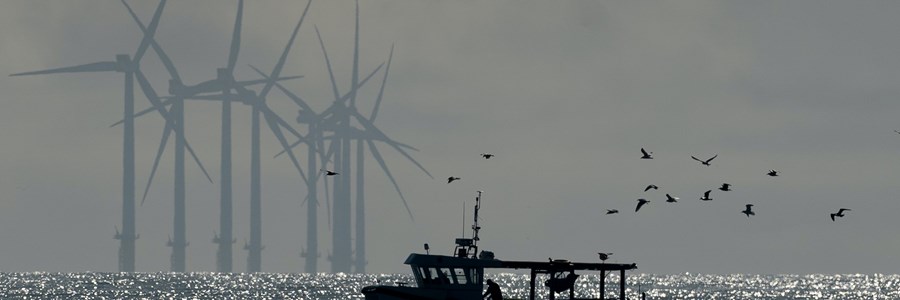Europeche calls on the European Commission to address escalating marine spatial squeeze

Europeche, the voice of Europe’s fishing industry, welcomes the Implementation Dialogue on the Maritime Spatial Planning (MSP) Directive, chaired by European Commissioner for Fisheries and Oceans, Costas Kadis. This important Dialogue forms part of the European Commission’s commitment to engage stakeholders and align maritime policies with on-the-ground realities ahead of the MSP implementation report due in March 2026. Europeche warned about the loss of traditional fishing grounds to an array of competing spatial pressures, of which offshore wind and marine protected areas top the list.
‘Europeche welcomes this initiative as European seas stand at a critical crossroads,’ said Daniel Voces, Managing Director of Europeche. ‘While the demand for marine space from energy, minerals, transport, tourism, and conservation grows rapidly, fishing is the only shrinking blue economy sector. Despite the enormous value in producing low carbon, healthy and sustainable food, fishing is increasingly pushed aside by spatial planning that lacks effective safeguards.’
Voces highlighted the alarming outlook for fisheries, noting, ‘In the UK, projections estimate that nearly 50% of the UK's EEZ could be fishing-free by 2050[1]. All indicates that with similar trends can happen across European sea basins.’ While Europeche recognised the need for effective marine protected areas and net-zero targets, the projected scale of future spatial demands is unprecedented—and poses serious risks to the viability of the fishing sector. This spatial squeeze increases operational costs, raises safety concerns, drives up fuel use and emissions. ‘Ironically, this reverses the progress our fleet has made—already reducing emissions by 52% since 1990.’
Unlike farmers, fishers do not hold property rights over their productive areas, leaving them vulnerable to continuous displacement and loss of access. Exclusion from traditional fishing grounds is very real and results in severe displacement of fishing effort, causing over-concentration in smaller areas. Such overcrowding leads to gear conflicts, difficulties in catch composition and increased pressure on local fish populations. Small-scale fleets with limited operational ranges face even greater impacts, with limited or none alternatives available. ‘The motto ‘fish somewhere else’ simply denies the problem,’ Voces emphasized.

Europêche’s call to EU policymakers
Europeche urges policymakers to take this Dialogue as a crucial opportunity to modernise and rebalance the MSP Directive. Key demands include:
- Treating fishreries and food sovereignty as a priority and overriding public interest, similar to renewable energy under the Nature Restoration Law.
- Ensuring mandatory early and meaningful participation of fishing stakeholders in all planning and decision-making processes.
- Applying equal environmental scrutiny across all blue economy sectors through an ecosystem-based approach.
- Integrate robust assessments of displacement, cumulative impacts and trade-offs.
- Protecting traditional fishing grounds with robust impact assessments and safeguards.
- Applying area closures and potential fisheries exclusions on a case-by-case basis
- Introducing gear-based buffer zones around offshore wind farms and marine protected areas to reduce socio-economic impacts on fisheries.
- Promoting genuine co-existence and co-location of offshore wind, conservation and fishing by aligning regulations, removing barriers, advancing blue skills development and fostering technology collaboration.
- Designing concrete mitigation measures and financial support tools to help fishers adapt to unavoidable displacements.
- Strengthening cross-border cooperation and sea basin approach.
- Prioritising less space-intensive technologies, such as tidal and wave energy, which offer lower environmental impacts and greater compatibility with fisheries.
‘Fishing is not an obstacle to the EU’s strategic goals—it is an ally,’ Voces stressed. ‘We must replace today’s trajectory of exclusion with a new model of positive coexistence.’
Next steps
As announced in the EU Ocean Pact, the Commission plans to revise the existing MSP Directive by 2027 and leverages the ocean’s potential for Europe’s resilience, food sovereignty, energy supply, security and competitiveness. It will also reinforce cooperation with international initiatives, notably through increased cross-sectoral coordination and through a better organised sea basin approach. The Commission also intends to simplify procedures and reduce administrative burdens.
END
Press Contact:
Rosalie Tukker, Senior Policy Advisor of Europêche
Email: rosalie.tukker@europeche.org │ Phone: +32 489 26 81 07
[1] https://www.nffo.org.uk/wp-content/uploads/2022/06/R3900_SpatialSqueeze_Final_23Jun2022-part-1.pdf
Photo Credit: Bob Brewer on Unsplash
Sources: Europeche
Attachments:
Tags: MSP, Maritime spatial planning, spatial squeeze, MPA, fishing, wind farms